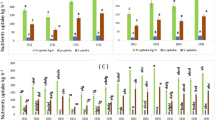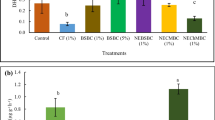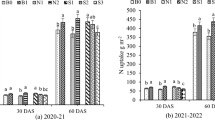Abstract
Background, Aims and Scope
The economic growth that Nigeria has enjoyed as a result of oil revenue has its drawback through exposure of people in the oil producing areas to environmental contamination, due largely to the increase in the movement of oil. Activities associated with oil well drilling on agricultural lands have led to serious economic losses on the communities affected. The local people in most of these communities are peasants who do not know how to react to drilling wastes or polluted fields where they have their crops. A case under study is the Kutchalli oil drilling area.
Methods
Waste pit soil from drilling waste dumps in Kutchalli oil drilling area was tested whole and in combinations with 'clean' soil for their abilities to support plant growth and development in common bean (Vigna unguiculata) and maize (Zea mays). Seed germination, plant height, leaf area, biomass accumulation, respiratory activity as well as soil chemical analysis were used to access the ability of waste pit soil to support plant growth and development in the test plants.
Results
Discussion and Conclusions. Waste pit soil completely inhibited the germination of bean and maize seeds. Waste pit soil in combinations with different proportions of Kutchalli soil gave growth (germination, height of plants, number of leaves, leaf area, etc.) values that were inferior to the control soil (Kutchalli) and the independent control soil (Monguno). Seeds planted in the test soil combinations containing waste pit soil showed significantly low respiratory activity. Waste pit soil seems to be toxic to plant growth and development. Drilling mud in combination with native Kutchalli soil significantly enhanced plant growth and development.
Recommendations and Outlook
The seed germination, growth and development inhibition by waste pit soil suggests its toxicity. We want to suggest the need for strict control and monitoring of waste pit soil in oil drilling sites.
Similar content being viewed by others
Author information
Authors and Affiliations
Corresponding authors
Rights and permissions
About this article
Cite this article
Anoliefo, G., Isikhuemhen, O. & Ohimain, E. Sensitivity Studies of the Common Bean (Vigna unguiculata) and Maize (Zea mays) to Different Soil Types from the Crude Oil Drilling Site at Kutchalli, Nigeria (7 pp). J Soils Sediments 6, 30–36 (2006). https://doi.org/10.1065/jss2005.09.145
Received:
Accepted:
Published:
Issue Date:
DOI: https://doi.org/10.1065/jss2005.09.145




